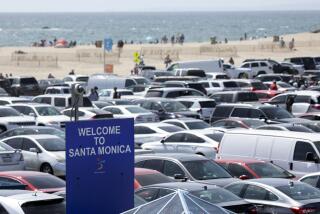Guest Passes to Limit Street Parking : Congestion: Glendale Community College students will soon lose the right to leave their cars in nearby neighborhoods. Each resident in new restricted areas will get two permits for visitors to use.
- Share via
GLENDALE — After years of complaints from residents, the Glendale City Council this week adopted a guest parking pass system to help untangle traffic snarls on residential streets surrounding Glendale Community College.
Beginning Nov. 25, dozens of streets in the College Hills area will be posted with restricted parking signs to force college students who have been parking for free to use student lots or nearby metered city lots.
Residents of every home affected by the restrictions will be issued two parking passes to allow gardeners, guests and other visitors to park on the streets during weekdays. The passes will be issued without charge, and additional passes may be requested to accommodate guests for special events, said George Miller, public works director.
Many residents have been waiting more than three years for the city and college to work out some sort of solution to resolve parking congestion in their neighborhoods, said Jennifer Jenkins, a city traffic engineer assistant.
If the pilot program around the college is successful, guest vouchers could be issued throughout the city after the first of the year to residents in more than 80 neighborhoods that have restricted parking zones, officials said.
Currently, residents can buy a permit for $6 a year per vehicle to park on the street, rather than in their own driveway or garage. That fee will not change. However, the city has had no procedure to allow service vehicles or guests to park in restricted zones beyond the time limit.
One- and two-hour restrictions will be posted over the next several months in neighborhoods around the college, eventually eliminating almost 1,700 residential street spaces now used by students, Jenkins said.
The restrictions will apply on school days only--from 7 a.m. to 10 p.m. Monday through Thursday and from 7 a.m. to 5 p.m. Friday. There will be no parking restrictions on Friday nights, weekends or holidays, when parties and other residential events usually occur, Miller said. In exchange, the college is expected in December to complete construction of a 750-space student lot, additional spaces on city lots near the college are being converted for student use, and more street parking in non-residential areas is being added.
A multilevel parking garage is to be built by the city in 1995 across from the college at Verdugo Road and Mountain Street to provide 375 more student spaces.
The changes mean that students will have to pay either $40 a semester for a parking permit or 50 cents an hour at city meters. For years, many students at the campus, which has an enrollment of almost 15,000, have grabbed whatever space they can find in surrounding neighborhoods. Students who violate the new restrictions will face fines of $25 per day.
The new restrictions will be implemented in phases over the next several months, Miller said. Guest permits will be issued initially to residents along streets that already have restricted parking, which represents about 230 street spaces.
New limitations also will be posted in nearby neighborhoods that currently have no restrictions, removing another 988 spaces used by students.
A second phase, to be initiated with the start of the spring semester Jan. 4, targets 472 more residential street spaces farther from the college to be posted for preferential parking only. Maps on the streets designated for restrictions are available from the public works office in the Civic Center.
A final phase will allow residents in any other neighborhood affected by student parking to request restricted zones. The restrictions will not be applied if a majority of residents on any one street object, officials said.
City Manager David H. Ramsay called the traffic congestion surrounding the college “one of the most serious parking issues facing this city.” City and college officials had bickered for years over how the problem should be solved.
City officials said the college should provide more on-campus parking facilities, while college officials countered that state laws limit the use of educational funds to resolve parking issues.
The two sides formed an unusual pact three years ago when they jointly funded a study to resolve the disagreement. The private study determined that the college needs 2,790 parking spaces to accommodate all of its faculty, students and visitors.
As a result, the combination of improvements are under way by the college and the city, which have since formed a joint parking authority. Costs of the improvements are expected to be recovered from parking permit and meter fees to be paid by students over the next 20 years, officials said.
If the guest parking program succeeds, similar permits may be made available to residents in other neighborhoods, such as areas surrounding the downtown redevelopment zone, business districts and schools. Restricted parking zones have become commonplace since streets were first posted around the Montrose shopping district in 1981, officials said.
More to Read
Sign up for Essential California
The most important California stories and recommendations in your inbox every morning.
You may occasionally receive promotional content from the Los Angeles Times.













